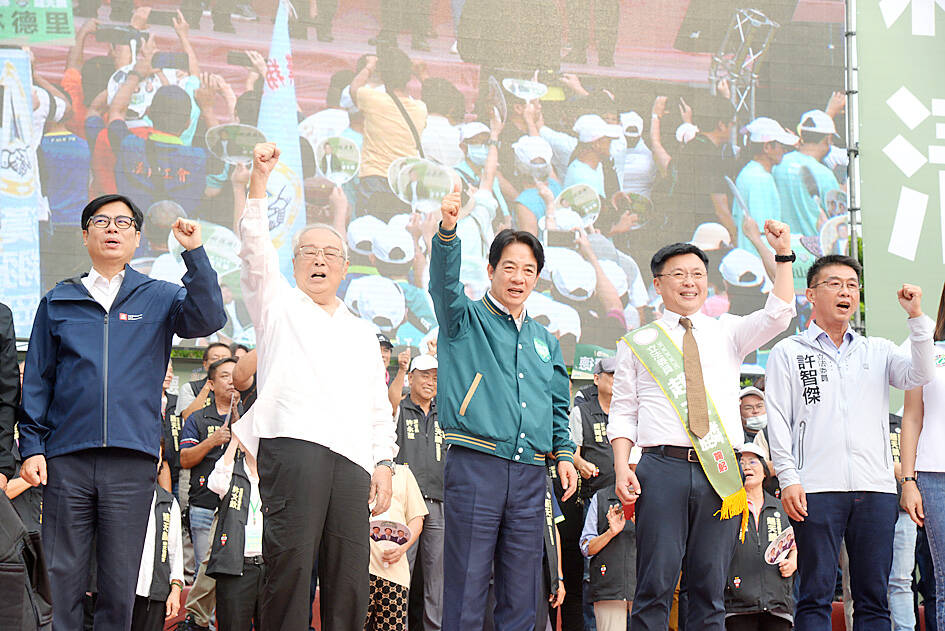Accepting the so-called “1992 consensus” is equivalent to abandoning the sovereignty of Taiwan, Vice President and Democratic Progressive Party (DPP) presidential candidate William Lai (賴清德) said while campaigning in Kaohsiung yesterday.
The “1992 consensus” refers to a tacit understanding between the Chinese Nationalist Party (KMT) and the Chinese Communist Party (CCP) that both sides of the Taiwan Strait acknowledge that there is “one China,” with each side having its own interpretation of what “China” means.
“Sovereignty is like ownership of the property. You can protect the property only if you have the ownership. Without sovereignty, you lose land deeds, property ownership, democracy and human rights,” Lai said.

Photo: Hsu Li-chuan, Taipei Times
“Taiwan is an independent nation, with sovereignty belonging to the 23.5 million people who live there. It does not belong to China or other nations,” he said.
Signing a peace agreement with China, as some people have proposed, would not achieve real peace, Lai said.
“If a peace agreement works, Tibet would be a different place. Opposition parties proposed that we accept the ‘1992 consensus,’ which maintains the ‘one China’ principle and would lead to ‘one country, two systems.’ Accepting the ‘1992 consensus’ means giving up Taiwan’s sovereignty and losing freedom and democracy,” Lai said.

Photo: George Tsorng, Taipei Times
The problem in the Taiwan Strait is not a continuation of the Chinese Civil War, nor is it merely a problem between Taiwan and China, Lai said.
“This is a problem that the world has to deal with. We need to jointly protect Taiwan by forming alliances with other democratic countries,” he said. “We must not be afraid because China is intensifying its threat against Taiwan.
The government would be willing to talk to China if Beijing treats Taiwan with respect and dignity, he added.
Separately yesterday, New Taipei City Mayor and KMT presidential candidate Hou You-yi (侯友宜) told supporters that January’s presidential election is “a choice between peace and war” and pledged to keep the Taiwan Strait peaceful and safe.
Russia’s invasion of Ukraine has made the world worry that a war could break out in the Taiwan Strait, Hou said, adding that the US’ support of Taiwan shows the international community is concerned about the safety of Taiwan.
The DPP would push Taiwan to the brink of a war once it is elected to govern the country again, Hou said, adding that he would investigate all the scandals that happened under the DPP government once he is elected president.

Taiwan has received more than US$70 million in royalties as of the end of last year from developing the F-16V jet as countries worldwide purchase or upgrade to this popular model, government and military officials said on Saturday. Taiwan funded the development of the F-16V jet and ended up the sole investor as other countries withdrew from the program. Now the F-16V is increasingly popular and countries must pay Taiwan a percentage in royalties when they purchase new F-16V aircraft or upgrade older F-16 models. The next five years are expected to be the peak for these royalties, with Taiwan potentially earning

STAY IN YOUR LANE: As the US and Israel attack Iran, the ministry has warned China not to overstep by including Taiwanese citizens in its evacuation orders The Ministry of Foreign Affairs (MOFA) yesterday rebuked a statement by China’s embassy in Israel that it would evacuate Taiwanese holders of Chinese travel documents from Israel amid the latter’s escalating conflict with Iran. Tensions have risen across the Middle East in the wake of US and Israeli airstrikes on Iran beginning Saturday. China subsequently issued an evacuation notice for its citizens. In a news release, the Chinese embassy in Israel said holders of “Taiwan compatriot permits (台胞證)” issued to Taiwanese nationals by Chinese authorities for travel to China — could register for evacuation to Egypt. In Taipei, the ministry yesterday said Taiwan

Taiwan is awaiting official notification from the US regarding the status of the Agreement on Reciprocal Trade (ART) after the US Supreme Court ruled US President Donald Trump's global tariffs unconstitutional. Speaking to reporters before a legislative hearing today, Premier Cho Jung-tai (卓榮泰) said that Taiwan's negotiation team remains focused on ensuring that the bilateral trade deal remains intact despite the legal challenge to Trump's tariff policy. "The US has pledged to notify its trade partners once the subsequent administrative and legal processes are finalized, and that certainly includes Taiwan," Cho said when asked about opposition parties’ doubts that the ART was

If China chose to invade Taiwan tomorrow, it would only have to sever three undersea fiber-optic cable clusters to cause a data blackout, Jason Hsu (許毓仁), a senior fellow at the Hudson Institute and former Chinese Nationalist Party (KMT) legislator, told a US security panel yesterday. In a Taiwan contingency, cable disruption would be one of the earliest preinvasion actions and the signal that escalation had begun, he said, adding that Taiwan’s current cable repair capabilities are insufficient. The US-China Economic and Security Review Commission (USCC) yesterday held a hearing on US-China Competition Under the Sea, with Hsu speaking on